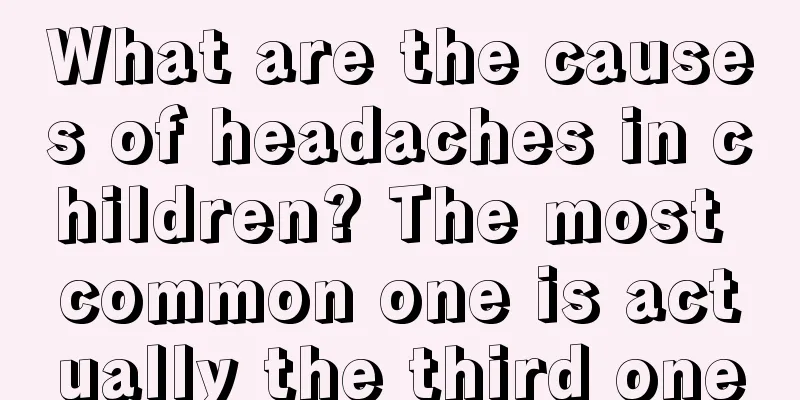What are the causes of headaches in children? The most common one is actually the third one

|
Headache is a common phenomenon, and many people have experienced headache. So, what are the causes of headache in children? What causes headaches in children?1. Meningitis. 2. Brain tumor: A mass inside the skull causes some arteries and venous sinuses to be affected and cause headaches. 3. Fever or hypoxia: The blood vessels in the brain will dilate and cause headaches. 4. Problems with head organs: For example, sinusitis, glaucoma, myopia, otitis media, and toothache may also cause headaches. 5. Lack of sleep and emotional tension: Excessive contraction of the head muscles can also cause headaches. 6. Psychological factors: such as schoolwork pressure and the desire to get more care and attention from parents can also cause headaches. 7. Drug and lead poisoning. 8. Nephritis and hypertension: High blood pressure can cause headaches, while nephritis can cause high blood pressure, which sometimes causes headaches in children. How to deal with headaches: There are two ways to deal with headaches in children: If the child has had headaches for a long time and each attack is no different from the past, just rest and observe; if the pain is severe and the child cannot fall asleep, he or she can take some painkillers. If the headache is the first time, you must be careful and it is best to ask a professional doctor to check to make sure that the headache is not caused by potential factors such as brain tumors or increased intracranial pressure. If the above lesions are suspected, the child should be hospitalized for further examination. How to prevent headaches in children1. Avoid soft tissue damage and infection of the head and neck. Avoid contact with and intake of irritating foods, avoid emotional fluctuations, etc. At the same time, the primary disease of secondary headache should be diagnosed and treated in time. Sedatives, anti-epileptic drugs and tricyclic antidepressants have a certain effect on preventing primary headaches such as migraine and tension headaches. The main thing is to prevent the primary disease, pay attention to the regularity of life, avoid excessive fatigue, excessive stress, and avoid sub-health status. 2. If the headache is the first time, especially if it is accompanied by high fever, vomiting, stiff neck, photophobia and other symptoms, you must be careful and it is best to ask a professional doctor to check immediately to determine whether the headache is caused by a serious disease such as brain tumor or encephalitis. If these diseases are suspected, you should be hospitalized for further examination. If it is determined to be a benign headache, no further examination is needed. 3. In fact, most children's headaches are benign and can be treated with ordinary painkillers. When the headache first occurs, you can give the child some water, some snacks such as biscuits, or take him to play outdoors in the fresh air for a while to see if it will get better. How to help children relieve painTo treat a child's headache, you need to see a doctor to determine the cause of the child's headache. However, most common headaches in children can be treated without medication through home care. To relieve your child's headache, you can have him: Lie down in a cool, dark, quiet room Place a cool, wet towel on his forehead or eyes ·Relax Take slow, deep breaths You can also use some over-the-counter analgesics, such as ibuprofen or acetaminophen. But before using the medicine, especially for children under 2 years old, you must pay attention to the use of the medicine. You can also consult a doctor before using the medicine. How to prevent colds in children1. Exercise This can not only enhance children's physique, but also prevent colds. 2. Pay attention to hygiene There are many causes of colds, so you should be extra careful to prevent them. In addition to dressing your child in the right amount of clothes, you should also keep the room temperature appropriate. If the weather changes suddenly, you should pay special attention to keeping warm. In addition, you should try not to let your child stay in an environment with severe pollution or secondhand smoke. 3. Avoid cross infection In kindergartens or hospitals, in order to avoid cross-infection of bacteria, you can wear isolation clothing; after contacting sick children, you must wash your hands in time. At home, if an adult has a cold, you should also avoid letting the child come into contact with the pathogen. 4. Drug prevention Drug prevention can not only improve the body's cells' ability to resist disease, but also improve the function of humoral immunity. The main drugs include Carbomer and Levamisole. Before taking the drugs, you should consult your doctor carefully. 5. Vaccination Vaccination can effectively enhance the respiratory tract's defense against infection. Related research has shown that the use of attenuated virus vaccines can stimulate the formation of secretory IgA antibodies, which have a very significant effect on resisting respiratory tract infections. |
<<: What are the most popular Christmas gifts for children?
>>: What are the dangers of children crossing their legs?
Recommend
What should I do if my baby who is not yet one month old catches a cold? How to treat a newborn baby's cold
Babies who are not yet one month old have low imm...
Can I wean my baby in winter? Is it good to wean my baby in winter?
Weaning is something that every mother must do. N...
The best time and techniques for conception What are the symptoms of conception
Preparing for pregnancy is a difficult process, e...
Which country does the Chinese toothpaste belong to? Where is the Chinese toothpaste produced?
When I heard the name of Zhonghua Toothpaste, I f...
How long can a newborn baby have his hair cut and shaved?
Mothers don't have to worry about their child...
How long will it take for a pregnant woman to give birth after the appearance of cervical mucus?
The mother just woke up and found a yellowish, tr...
What should I do if my baby's fontanelle closes too early? What are the dangers of premature closure of my baby's fontanelle?
There are certain disadvantages if the baby's...
Can I eat crabs during pregnancy preparation? Is it good to eat crabs during pregnancy preparation?
During the period of preparing for pregnancy, wom...
What should I do if my child likes to talk back? Why do children like to talk back?
Many parents have trouble educating their childre...
Can babies eat donkey-hide gelatin? Can children eat donkey-hide gelatin?
Can children eat donkey-hide gelatin? Donkey-hide...
Can newborns with bloating drink tangerine peel water? Can newborns with bloating drink Simo decoction?
It is a very common phenomenon for newborns to ha...
Why is it that babies grow teeth slowly? What foods are good for babies to eat when they grow teeth?
During the growth of babies, teething is a big wo...
Which is better, Wakodo or Pigeon mosquito repellent patch?
Wakodo Mosquito Repellent Patch and Pigeon Mosqui...
The correct way to use a breast pump Precautions for using a breast pump
Breast pumps are a good helper for working mother...
Is childbirth like breaking a bone? The pain of childbirth is not that exaggerated
When talking about childbirth, many female compat...









